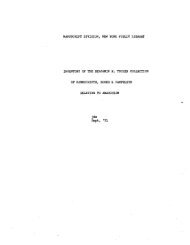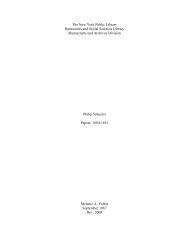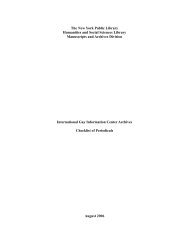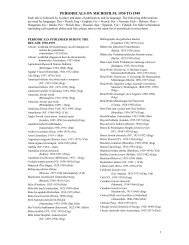pdf available - Multiple Choices
pdf available - Multiple Choices
pdf available - Multiple Choices
You also want an ePaper? Increase the reach of your titles
YUMPU automatically turns print PDFs into web optimized ePapers that Google loves.
52 LUBOML<br />
tears and their lips whispered the prayer Elohei<br />
Avraham. They did not forget, of course, to drop<br />
a few coins into the tzedaka box on behalf of R.<br />
Meyer Baal HaNes, or other charity boxes that<br />
hung in a corner of the room.<br />
With evening there was the impressive sight<br />
of hundreds of men, in their Sabbath best, walking<br />
with their children to the synagogues and<br />
shtiblach of all kinds. And only on the nastiest<br />
days, when the rain poured without let-up and<br />
the streets were filled with muddy puddles, did<br />
the residents of the outlying streets stay home<br />
and make their minyans [prayer groups of the<br />
required ten men] there.<br />
During the early morning hours, many rose<br />
and came to the bet midrash to say psalms or went<br />
to the mikve for ablutions there. At about 8:00 or<br />
9:00 in the morning, after reading and studying<br />
the Torah and a page of Gemara at home, they<br />
flocked to the synagogues for prayers, even the<br />
women.<br />
The simple folk, who prayed quickly in the<br />
bet midrash or their own little shuls, would finish<br />
before the Chasidim in their shtiblach. Especially<br />
well known in our town were the Radziner<br />
Chasidim, who, in addition to identifying themselves<br />
by the blue thread in their tzizit (fringes),<br />
were known to begin their Sabbath prayers late,<br />
not until after 10 o'clock.<br />
Sabbath Zmiros [songs] were heard in the<br />
courtyards and in the streets in front of many<br />
homes on Sabbath afternoons, and it was especially<br />
pleasant to hear the melodies of certain<br />
families who had particularly nice voices.<br />
After an afternoon nap, students and Torah<br />
scholars made their way to the bet midrash to<br />
study a page of Gemara and the simple folk<br />
studied Mishnayos and Ein Yakov. The children<br />
went to their teachers to study Pirkei Avot in the<br />
summer, and Borchi Nafshi in winter. Women<br />
stayed at home and read Kahal Chasidim, Tz'ena<br />
U'rena, and others.<br />
In summer many workers and young people<br />
took a walk on the Polish Street and in the nearby<br />
grove to get a breath of fresh air. Very pious Jews<br />
refrained from taking walks, for they were afraid<br />
of overstepping the limit of the distance they<br />
were allowed to walk on the Sabbath.<br />
More than once the townspeople suffered the<br />
misfortune of having the eruv [boundary within<br />
which observant Jews may carry items on the<br />
Sabbath] break. In these instances Avrom the<br />
Lame, of blessed memory, who was one of the<br />
most observant people in the town and was in<br />
charge of putting up the eruv and seeing to it that<br />
it remained without a break, would make the<br />
rounds of the synagogues and announce an emergency<br />
situation, where it was forbidden to carry<br />
anything outside of one's house.<br />
On these Sabbaths, children under 13 would<br />
carry their parents' prayerbooks and shawls to<br />
the synagogues and back. This also applied, of<br />
course, to the Sabbath cholent [a stew that cooks<br />
throughout the Sabbath, on a stove that remains<br />
lit], which they put into their neighbors' stoves,<br />
and which they were usually allowed to carry on<br />
the Sabbath.<br />
From the beginning of the Sabbath until<br />
early Sunday morning, no non-Jew was seen in<br />
the main streets of the town, and the marketplace<br />
was still. A non-Jew who forgot what day it was,<br />
and came into town by mistake, turned around<br />
and left in shame.<br />
When a Child Is Born . . .<br />
It is worthwhile mentioning a typical custom of<br />
our townspeople, in the days when children<br />
were brought into the world "in a good and<br />
fortuitous hour" in their parents' homes, with the<br />
help of grandmothers and aunts who drew their<br />
knowledge from the births of their own children<br />
or of others in the family, or with the help of the<br />
midwife (sans diploma) of the town, known as di<br />
bobe (Granny)<br />
When a woman was ready to give birth, a<br />
curtain was drawn about her bed that would<br />
divide her from the rest of the house for reasons of<br />
modesty and against the "evil eye." The women<br />
would paste up on the door lintels printed copies<br />
of the Shir Hama'alot psalms. Some also put<br />
under the woman's head a copy of the holy book<br />
The Angel Raziel, as a talisman protecting mother<br />
and child against bad spirits, devils, and all sorts<br />
of evil forces.<br />
If a son was born, the beadle would announce<br />
this festive event to the congregation at







